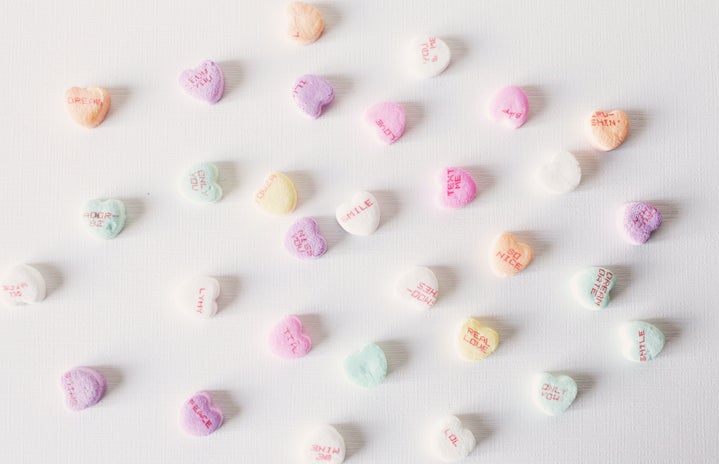I doubt there’s a more needlessly polarizing commercial holiday than Valentine’s Day. It’s either loved or hated, people either roll their eyes and pretend not to notice its arrival or they show up to lecture in a pink and red ensemble with some form of elaborate makeup, usually featuring hearts. I know this because I did it, and have done it both ways.
There seems to be four groups of people regarding Valentine’s Day: 1) the anti-V-Day crowd; 2) the usual Valentine’s Day lovers who celebrate the holiday as normal; 3) those who genuinely don’t care; and 4) those who have reclaimed Valentine’s Day, regardless of relationship status, to celebrate love in all of its many and messy forms. Historically, I have been a part of group number four.
Although, I do cringe a little when I look back at my all-pink outfits and my refusal to hate Valentine’s Day. Maybe I find it embarrassing because I was chronically single, and choosing to celebrate Valentine’s Day so visibly and unabashedly, in retrospect, seems like I was screaming, “I’m not sad!!! I’m perfectly happy alone!” And part of me just wants to say to her, you can chill. But, then again, I was and am perfectly happy alone. There was also something inherently sweet about my reluctance to feel bad about myself when there was, and is, so much love in my life.
But there were other reasons for this behaviour. One being that I simply refused to be lumped into the sad group of women who carried their hatred of Valentine’s Day around like a strangely depressing badge of honour. It could be said that this was akin to the “I’m not like other girls” phenomenon, but more like “I’m not like the other single, bitter girls who reject love for a dumb reason like not having a partner.” And, to be fair, I do think rejecting Valentine’s Day for the sole reason of being single is, frankly, a dumb reason. But I think the way we celebrate Valentine’s Day in general deserves far more criticism than just that.
How we celebrate love in our culture is deeply problematic. There is, of course, the obvious capitalist commercial element, where corporations profit off of Valentine’s Day by promoting gifts and paraphernalia for partners that are either a) cheap and tacky (which generates a ton of waste when the stuffed teddy bear from Dollarama inevitably gets thrown out); or b) gifts that are extravagant, expensive and virtually meaningless. Yes, this does include the promise ring from Pandora that too many former sixteen-year-olds have stored away somewhere in a dusty childhood jewelry box. But maybe I’m a hypocrite. There is, after all, some sentimental element tied to the fleeting and panicky nature of the V-Day gift. Maybe we can chalk that up to being brainwashed by consumerism.
Beyond this, my second bone to pick is who we choose to celebrate on Valentine’s Day. This was the most valid reason behind my decision to celebrate V-Day despite my persistent singledom. It is ridiculous and sad that we live in a culture so blinded by restrictive and idealistic notions of romanticism that Valentine’s Day is limited to those in romantic relationships. As if other forms of love do not exist and are not as equally valuable. Why have we not popularized celebrating our closest friends on V-Day? Why not our parents or siblings, or anyone else who we share deep and loving bonds with? We should be doing this, not only when we’re single, but also when we’re in relationships. Why has love become synonymous with “The One”–ie. a person who supposedly fulfills all of your romantic, physical, sexual and emotional needs.
In her book, All About Love, bell hooks writes about how toxic this conceptualization of love is to our relationship with others. Not only does it mean we under-value the countless other people in our lives who contribute different forms of love, but it also means we end up putting too much weight on our romantic partners, expecting them to deliver every expectation and desire on a silver platter, even though it is an impossible task. Partners who expect this will come off as needy and will be disappointed when they discover that their current lover cannot meet all of their needs. What’s more, they may even begin to resent their partner, wondering why their love doesn’t match the love depicted in TV shows and movies.
Different relationships will satisfy different purposes. For hooks, love is an ethic that informs the way we live and the way we exist in community with one another. It’s not polygamous, but it is pluralistic. The idea of celebrating love is beautiful because to love and to feel loved is one of the most spiritually fulfilling things a human can experience. At the end of the day, I am and have always been a romantic. But for love to be honoured properly, we must celebrate it in ways that are deeply felt and not funneled into one person. Who ever convinced us that love could be so limiting?

